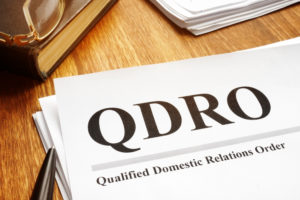If you and/or your spouse contributed to an employer-sponsored retirement plan during your marriage and there is no prenuptial agreement changing the default rules, under California law, a community property interest exists for which a spouse who did not participate in the plan is entitled to a portion of the participating spouse’s accumulated benefits during the period of marriage. Under such circumstances, the spouses must work together to come up with a settlement agreement concerning the division of those benefits, or the court would decide if the couple cannot agree.
A QDRO, or Qualified Domestic Relations Order, is an order obtainable through your divorce that allocates a portion of the participant spouse’s benefits payable under the plan to the other (nonparticipant) spouse as an alternate payee.
Distinguishing the Types of Retirement Plans
There are two categories of qualified retirement plans: (1) Defined Benefit Plans, such as pensions; and (2) Defined Contribution Plans, such as 401(k)s. The primary difference between the two is the form of benefit payable under the plan and how that benefit is calculated.

- Defined benefit plans express the participant’s balance as an accrued benefit that provides for systematic payments, as determined by a specific plan benefit formula, to the payee(s) over a period of time, usually for life, commencing at retirement.
- Defined contribution plans express the participants’ balances as an accumulated benefit consisting of the participant contributions and employer contributions as allocated by a plan-specific contribution formula and distributable after the termination of employment, a fixed number of years, attainment of a certain age, or another occurrence as determined by the plan.
There are many types of retirement plans, each of which is unique in the state and/or federal laws it must operate under, how the participant’s benefits are paid, and the rules specific to that particular plan. Understanding the retirement plan at issue and distinguishing its governing law, participant benefits and plan rules is instrumental to any discussions involving property division and determining whether a QDRO is needed to divide the plan.
Just as with all divorces, each retirement plan has its own unique aspects that require its own creative solutions. Failing to understand the retirement plan may lead to denial of the QDRO or even loss of benefits.
Divorce Decree Cannot Divide Retirement Plans
Our firm has found that there is a common misconception as to the necessity of obtaining a QDRO after a divorce decree has already been entered. Under federal law, a QDRO must be obtained in order for an employer-sponsored retirement plan to divide the participant spouse’s benefits. In most cases, the divorce decree is not enough for the plan to implement the division, even if the divorce decree clearly states that the benefits will be divided.
A divorce decree does not constitute a QDRO for purposes of plan implementation and dividing your benefits; however, if you and your spouse agree to divide a plan and intend to submit a QDRO later, it is imperative that your divorce decree or other settlement agreement addresses all retirement plan benefits and how they will be divided. Without this specification, the Court cannot enter a QDRO and a post-judgment motion would need to be filed to obtain an order for dividing the plan.
QDRO Attorney
QDROs are an especially complex part of the divorce process and failure to properly manage retirement plans can lead to substantial financial harm later on. There are many aspects concerning the division of retirement plans that must be considered, such as the participant spouse’s vesting status, how to determine the value of each plan, and apportioning separate property contributions.
For answers to all your questions about obtaining a QDRO in your divorce, contact us at The Law Office of Rebecca Medina to schedule a consultation.
Rebecca Medina is a California collaborative divorce lawyer and mediator serving clients statewide, with offices in Fresno and San Diego Counties. She focuses on mediation, collaborative divorce, and premarital and post-marital agreements, helping clients resolve family law matters through respectful, solution-focused processes that prioritize clarity and informed decision-making.
- Rebecca Medina
- Rebecca Medina
- Rebecca Medina
